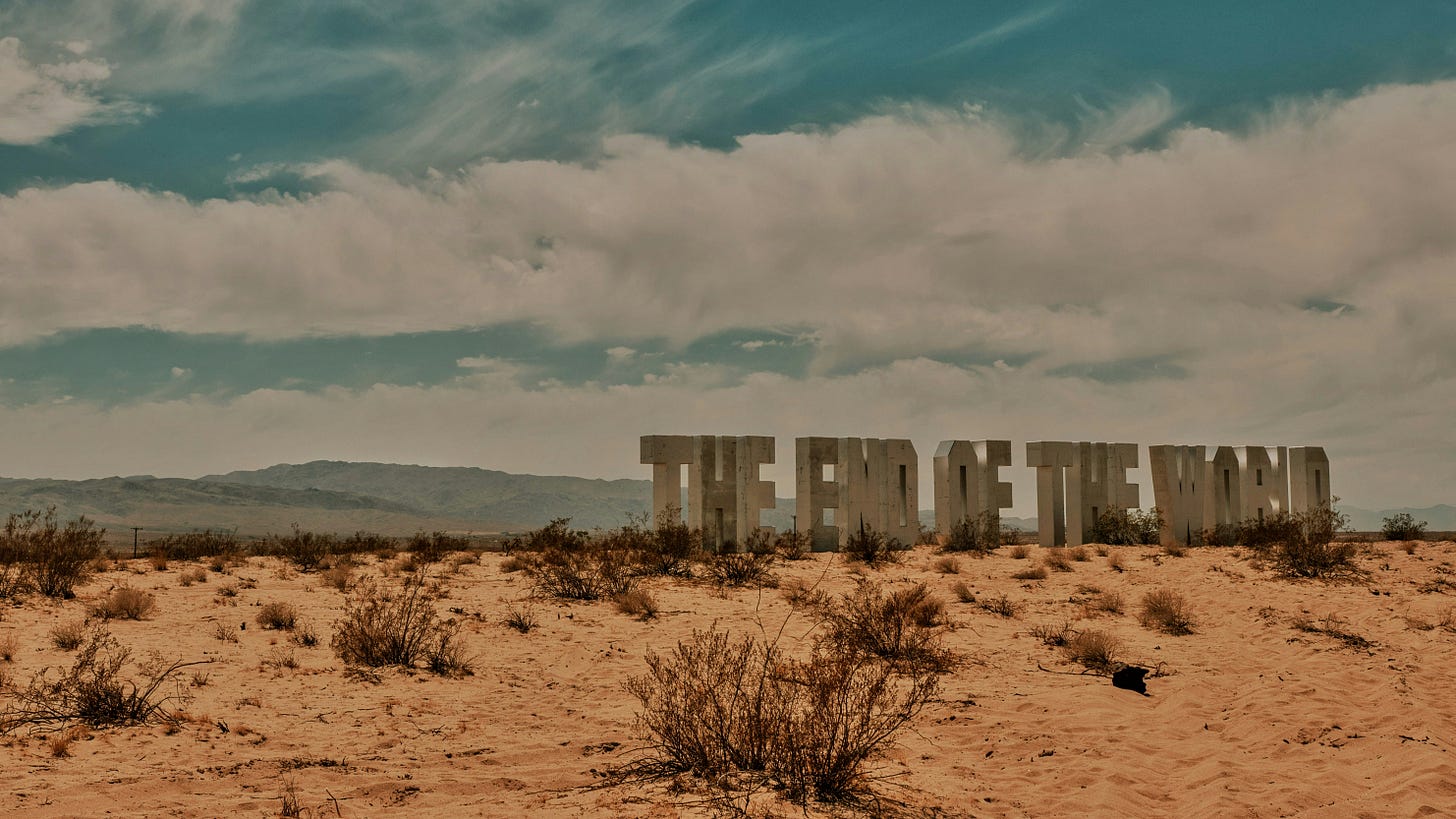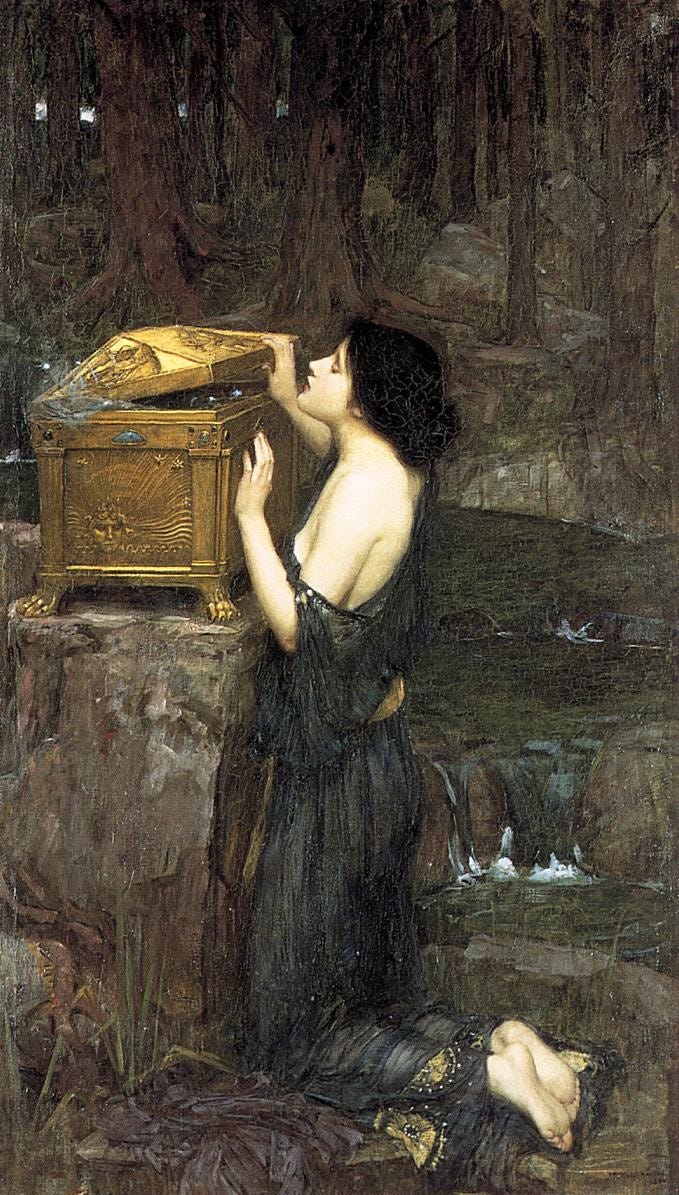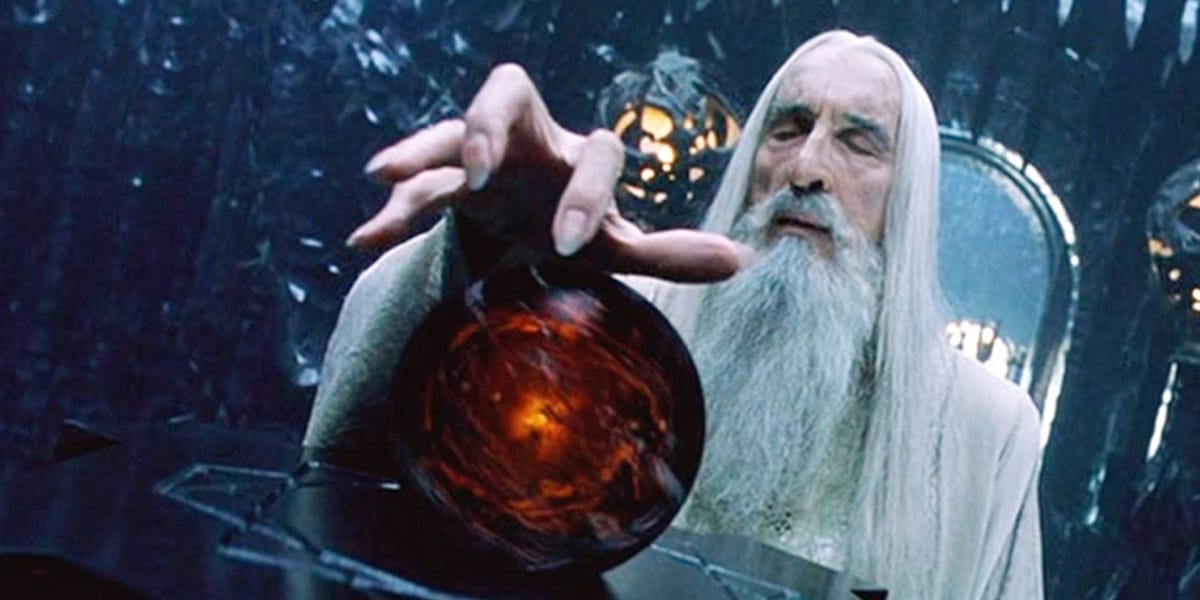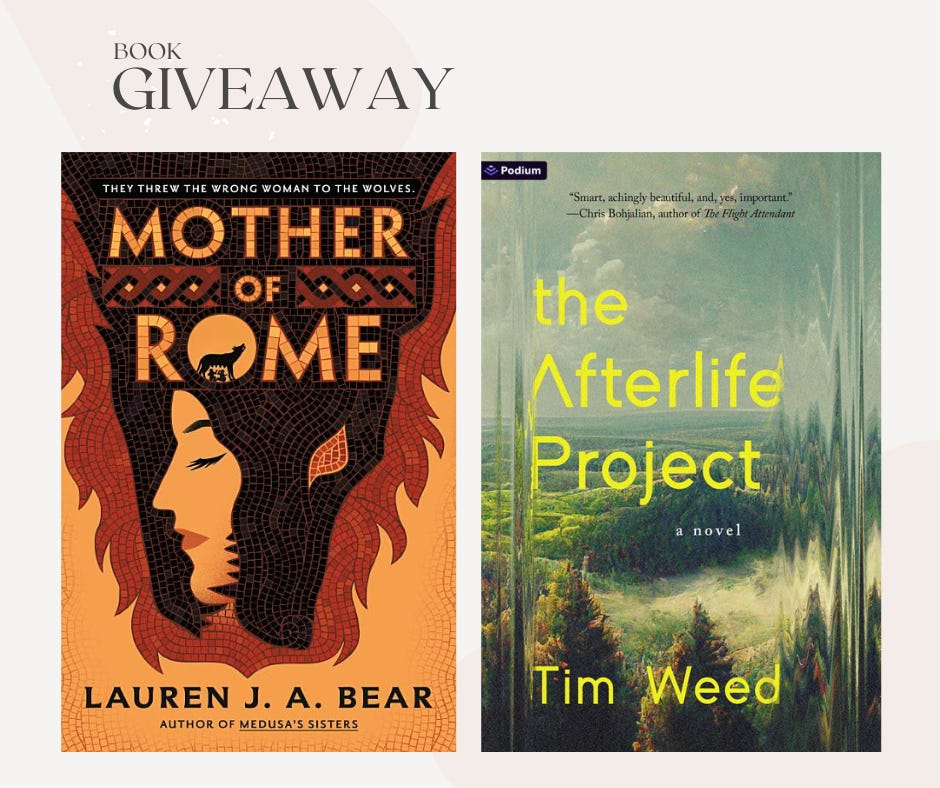Lessons from the End of the World
+ A book giveaway! Win Mother of Rome by Lauren J. A. Bear or The Afterlife Project by Tim Weed!

Last week, I stumbled across a Guardian piece about hypernormalization—the idea that we collectively pretend “everything’s fine” even as the ground shifts beneath us. In one sense, it’s astonishingly familiar: headlines blare about rolling back climate protections, gutting regulatory agencies, banning books, but nobody knows exactly what to do, how to make an impact. We carry on even as a creeping sense of unease settles in until numbness replaces outrage.
Since COVID, I’ve been thinking a lot about how societies slide toward dystopia. Especially now, when laws and institutions that once kept us safe are quietly dismantled, it looks a lot like the stunningly fast fade of happiness most dystopian novels warn us about. When you think about books like 1984, The Handmaid’s Tale, and more recently, Dave Egger’s The Circle, it used to feel like we were safely on the outside looking in. We’d close the cover, shake our heads, and move on, comforted that it wasn’t real. Now we’re not just turning pages, we’re living the story.
In practical terms, hypernormalization looks like this: we hear each week about another regulation being repealed, another public program defunded, or a department head fired (I’m talking about proposals to eliminate the Department of Education—or sudden shakeups like firing the head of the Library of Congress). Most of us scroll past it, maybe share a headline, but keep living our routines: commuting, meeting friends for coffee, bingeing a show, trying to keep going despite our safeguards and cultural touchstones are vanishing. So many people I know feel paralyzed, unsure what to do beyond going to a protest, or maybe donating money to help keep an agency like NPR afloat.
That’s the spark that lights the way toward dystopia. A thousand little nudges slowly strip away what gives life meaning and safety. Eventually, we may wake up and realize there’s nothing left to protect.
Dystopian books are selling like hotcakes right now. I hope this is still the case in December, when my fourth novel, THE HAPPINESS COLLECTOR, releases. It’s a story of ancient gods stealing happiness from the world. I think of it as a reverse Pandora’s box.
There’s something fascinating about it: when the world turns to shit, people turn to dystopia. I suppose it makes sense. Picking up a dystopian novel reminds us that feeling unsettled isn’t a sign of personal paranoia; it’s a reaction to real patterns. Seeing characters live through eerily similar power grabs or oppressive regulations confirms that our unease is valid. Instead of thinking, “Am I overreacting?” we can say, “No—this has happened in fiction, and it went badly.” That sense of validation gives us a sliver of perspective: “I’m not alone in noticing how scary this feels.”
Dystopian stories often follow an arc where people recognize injustice, they fight to survive (sometimes successfully and sometimes not), and we are forced to sit with the consequences. Even if the ending isn’t cheery, that emotional journey of coming to terms with a collapsing world and seeing characters resist can provide a kind of catharsis. It’s not exactly “misery loves company,” but it is a release valve.
Lately, when I like or share things in social media, I have a voice in the back of my head saying, don’t do that you idiot. The current regime is literally using an agency living up to its evil name, Palantir, to create a database to track all Americans. Will this blog post get cataloged, and my name on a list? Sigh. The very fact that it may be a real thing that could happen would have shocked 12 year-old me to death when I first read Orwell’s 1984. But I try to remind myself that in many dystopian narratives, a single small act of defiance can snowball into something bigger, like sharing a forbidden book, humming a banned song, or organizing an underground meeting.. Those moments spark hope. If a handful of people can push back against an all-powerful regime on the page, maybe we can do something, even if it’s small, in real life. Reading those small sparks of resistance reminds us that even in the darkest settings, agency still exists. It’s a way to mentally rehearse what resistance might look like. Or what to know we need to resist in the first place.
Beyond validation and catharsis, dystopian fiction also offers practical lessons in survival and resistance. Characters in The Handmaid's Tale preserve knowledge through secret networks, those in Fahrenheit 451 memorize entire books to become living libraries, and resistance is forced underground as language itself is stripped of meaning to prevent rebellion. These aren't just plot devices but blueprints for maintaining humanity when institutions fail. The books show us how to build alternate systems of support, information sharing, and community organizing before we desperately need them. They teach us to recognize the early warning signs, to value what might be taken away, and to create redundancies in our networks of care and knowledge. Reading dystopian fiction becomes a form of civic preparation, like learning CPR or keeping emergency supplies.
The current hunger for dystopian fiction isn't just about wallowing in doom or finding comfort in shared misery. It's about preparation and possibility. Even in the original Pandora myth, after all the evils escaped into the world, hope remained in the box. My upcoming novel, The Happiness Collector (by the way, pre-ordering helps authors a LOT, and today IS my birthday 🎂 ), out in December, explores what happens when ancient gods begin stealing happiness from the world, but like all dystopian fiction, it's ultimately concerned with how people respond when faced with seemingly insurmountable forces.
We read these stories not because we're resigned to dystopia, but because we're looking to understand how to recognize the signs of hope.
Where To Find Me
Weina Dai Randel and Crystal King discuss The Master Jeweler
I can’t wait to talk to Weina Dai Randel about her new novel, The Master Jeweler. Tuesday, June 24th at 7 PM at Belmont Books. The book is SO good! From the Wall Street Journal bestselling author of Night Angels comes the epic story of a brilliant young woman's dangerous rise to fame in the perilous world of jewelry in 1920s Shanghai--and the power of love and friendship. I hope you’ll join us!
And Now It’s Time For A…
What a fitting pairing of books for this giveaway! First you have Mother of Rome, a blazing reimagining of how Western civilization began, and The Afterlife Project, a haunting vision of how it might end. I loved both books for entirely different reasons. Mother of Rome gave me a fierce, unforgettable heroine in Rhea Silvia—her strength, rage, and sacrifice lit up every page, and I haven’t stopped thinking about her since. The Afterlife Project pulled me into a chilling future that felt all too real, with a story so original and propulsive I couldn’t put it down. Two brilliant, thought-provoking reads that left very different, deeply lingering marks.
Mother of Rome by Lauren J.A. Bear
In this bold reimagining of Rome’s founding myth, Rhea Silvia—mother of Romulus and Remus—steps out of the shadows of history to reclaim her story. A royal princess exiled to the Vestal Virgins after her father’s overthrow, Rhea is meant to remain childless, a pawn in a political game. But when she becomes pregnant, the punishment is death. Betrayed and cast out, she survives against all odds, striking a perilous bargain with the gods to protect her sons. As Rhea battles divine forces and human cruelty alike, she must summon a power greater than prophecy or politics: a mother’s will to shape the fate of an empire. All roads may lead to Rome, but they begin with her.
The Afterlife Project by Tim Weed
Facing extinction in the wake of a global hyperpandemic, a team of scientists launches the Centauri Project, sending microbiologist Nicholas Hindman ten thousand years into Earth’s future to search for signs of human survival. Stranded in a desolate wilderness, Nicholas clings to protocol even as hope fades. Meanwhile, in 2068, the last four project members sail a retrofitted solar yacht across a perilous, post-apocalyptic world to find a second test subject—a woman rumored to hold the key to humanity’s survival. The Afterlife Project, a finalist for the Prism Prize for Climate Literature, is a sweeping story of survival, love, and meaning stretched across deep time.
Do you want to win one of these books?
To sign up for the giveaway, you can fill out this form. Your name will be thrown into the hat for a shot at a paperback copy. This giveaway closes at midnight ET on Thursday, 06/12/25. Winners will be notified within a week (forgive the lateness here…I’ll be traveling!) of the giveaway closing and announced in a future newsletter/post.
Important to Note: You must be 18+ and a United States resident (pesky international laws make it tricky to do giveaways worldwide). If you are someone who loves to read the rules, you can find the obligatory info here.
What’s Bringing Me Joy
This AI video sent to me by friend Stacy cracked me up so much.
Cannot wait till December!
Thanks for Joining Me
If you love food and love Italy, and haven’t read IN THE GARDEN OF MONSTERS, THE CHEF’S SECRET or FEAST OF SORROW, click the links to learn where to buy your copy! And now you can pre-order my latest, THE HAPPINESS COLLECTOR!
You can also follow me here: Website | Instagram | Facebook | Threads | Bluesky








Happy birthday! Just pre-ordered 📚✅ and will leave this here for you…
https://www.etsy.com/listing/1820603777/make-orwell-fiction-again-embroidered
Thanks so much for doing this, Crystal, and for your kind words. Can’t wait for your new one!!